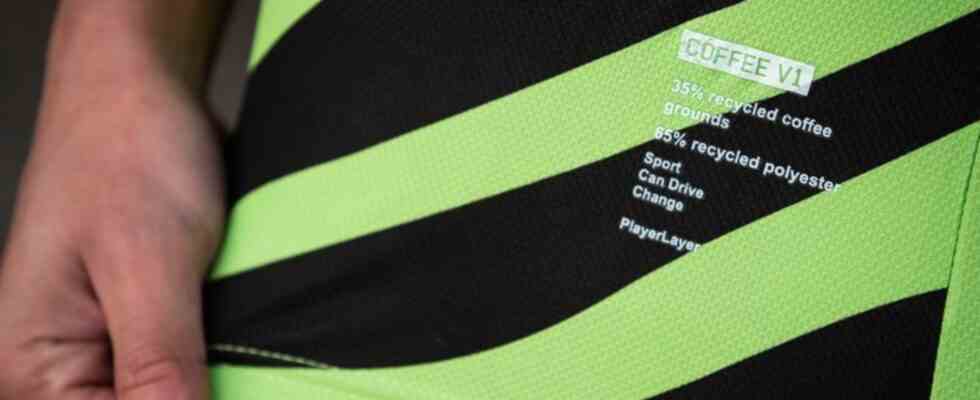football and recycling
Coffee shirts: what football is doing to make it more sustainable
A lettering indicates the recycled materials from which the Forest Green Rovers jersey was produced. photo
© Forest Green Rovers / PA Media / dpa
Almost every year, the Bundesliga soccer teams bring out three new jerseys – it has little to do with sustainability. Despite this, many clubs increase their commitment as part of their merchandising.
Anyone who likes to drink coffee knows these situations. If the machine has been used, the coffee residues must be disposed of, preferably in the organic waste bin. Coffee grounds can also be used as a fertilizer or cleaning agent. Even cosmetics can be made from it. Or jerseys.
The English third division team Forest Green Rovers wear shirts made from coffee leftovers and recycled polyester. The “greenest football club in the world” wants to reduce its dependence on plastic. It is the next step towards more sustainability of this club, which is extraordinary in every respect.
The “greenest club in the world”
There is only vegan food in the stadium and also for the players. The energy requirement is covered solely from renewable sources. A few years ago, the Rovers were recognized by the United Nations as the world’s first carbon-neutral football club. In times of burning fields and forests in Europe, they can be a role model, also for the 18 Bundesliga clubs. And even if neither FC Bayern, Werder Bremen nor any other first division team makes their jerseys from coffee residues, a lot is happening in Germany. On the other hand, there is still much more to do. In any case, no one has come as far as the club from the west of England.
Educate clubs on sustainability
“What you can say for sure is that sport as a whole is still lagging behind in comparison to most sectors,” says sustainability expert Stefan Schaltegger from Leuphana University in Lüneburg. “The textile industry or the chemical industry, for example, have been criticized for a long time and have therefore simply been on the road for a long time.” Nevertheless, the professor sees the Bundesliga club on the right track. From autumn, Schaltegger will be training club employees at his university in the field of sustainability. It will probably also be about the jersey production.
After all, how sustainable is it that almost every club puts three new shirts on the market every year? “Whether a new home, away and alternate jersey is needed every year is definitely doubtful from a sustainability perspective,” says Hannah Maidorn from Fairtrade. “In addition, the public discussion should not only be about the number of collections, but also about the way in which it is produced.” This is exactly what Fairtrade has in mind, which uses its seal to identify products that have been manufactured in accordance with certain criteria. For example, that fair wages are paid during production.
Do we really have to have new jerseys every season?
So far, this seal has not been emblazoned on the jerseys of the 18 Bundesliga teams. Which has to do with the fact that the shirts are made of 100 percent synthetic fibers and are therefore not made of Fairtrade-certified cotton. However: Many Bundesliga clubs make their jerseys from recycled polyester. In addition, some, like TSG 1899 Hoffenheim, say they are “internally up for discussion” as to whether new jerseys really have to be made every season. Hertha BSC and RB Leipzig are also up for debate. Fairtrade also points out that some already rely on Fairtrade cotton, at least in the manufacture of other merchandising products.
The organization particularly emphasizes VfB Stuttgart. According to Maidorn, through the cooperation with a textile company, the Swabians offer some garments whose entire supply chain is certified according to the Fairtrade textile standard. Another prime example is FC St. Pauli. The second division club has founded its own sustainable brand and has been making its own jerseys for two years. The Hamburgers had previously looked for an external supplier, but could not find anyone who, according to the club, would have produced sufficiently sustainably or transparently.
role models for others
“Clubs like St. Pauli, VfB Stuttgart, Hamburger SV or Werder Bremen have already taken a big step and can be a role model for others,” said Lara Schröder from the non-profit organization cum ratione. In a study, cum ratione analyzed the textiles in fan shops of the first and second division teams and the supply chains behind them. St. Pauli did best here too.
But the fact that there are still a number of clubs that are doing much worse is also due to a lack of “human and time resources”, as Schröder says. In any case, coffee has not yet been included in the jersey production of any Bundesliga team. Not everyone is as far as the Forest Green Rovers.

